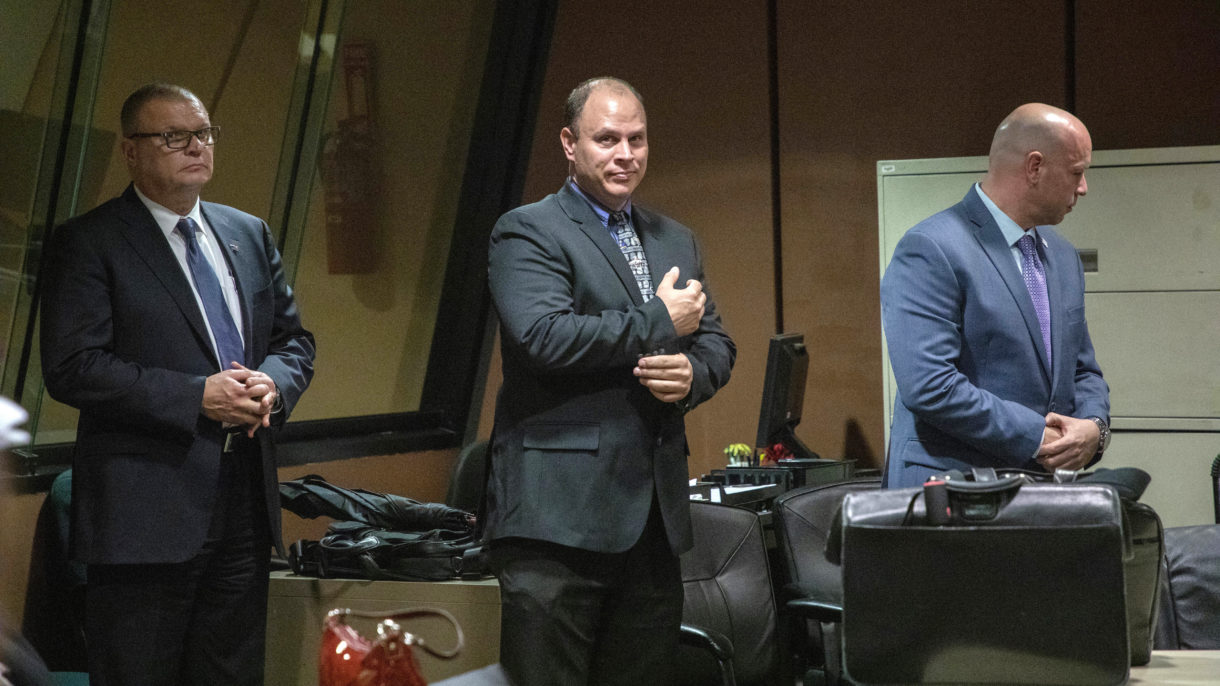Just hours after he shot and killed Laquan McDonald in 2014, Jason Van Dyke met in a Chicago police station with other officers who were on the shooting scene and with detectives tasked with investigating the incident.
Prosecutors say they discussed the shooting and watched a now-infamous dashcam video that shows Van Dyke opening fire within seconds of arriving.
Last month, Van Dyke was convicted of murder. Now, three other officers who were at that station are scheduled to go on trial Tuesday on charges they tried to cover up for him.
The charges against Officer Thomas Gaffney, former Officer Joseph Walsh, and ex-Detective David March include obstruction of justice, official misconduct, and conspiracy to commit those offenses.
The trial will focus on “consistently false information that could not have been submitted except for an agreement to write consistently false information,” Assistant Special Prosecutor Brian Watson said at a hearing in the case last month.
But defense attorneys insist the officers’ reports do not prove a conspiracy or any crime at all.
A meeting, then the reports
Prosecutors say the meeting after the shooting took place at a South Side detective facility called Area Central. They say officers then filled out reports on the incident.
The accounts of Walsh and Gaffney both resemble Van Dyke’s version of events. The officers each indicated that McDonald had committed “battery” consisting of an “attack with weapon.”
In Illinois, there is no battery unless the offender makes physical contact or causes a physical injury.
The video shows that McDonald, in the moments before the shooting, did not touch or injure anyone.
On their reports, Walsh, Gaffney, and Van Dyke also each used the same phrase — “swinging knife” — to describe what McDonald, 17, was doing before he was shot.
That raises a flag, according to former Chicago Police Cmdr. Lorenzo Davis, who investigated shootings by city officers after leaving the department.
“To use the same expression, to me, would indicate that they discussed what would go on these reports before they were done,” Davis said.
The “swinging knife” descriptions also clash with the video.
March, the third defendant, led the department’s investigation of the shooting. He reported that all the accounts by the officers were consistent with the video and concluded that the shooting was justified.
Another officer, Dora Fontaine, is expected to testify that March told her to report false information.
March’s attorney has called Fontaine a perjurer.
‘A little bit of bad paper’
Defense attorneys say there is no evidence of an agreement to report falsely.
Todd Pugh, a lawyer for Walsh, argued at the hearing last month that there was nothing wrong with the meeting in the police station or with the officers coordinating how they would handle the situation.
“Those factors are what occurs in every single major crime that occurs in this city,” Pugh said. “And it occurs at every single police department in this state and this country. This is not evidence of an agreement. This is typical standard operating procedure of what occurs in the wake of a major crime.”
“What this case comes down to,” Pugh said, “is what we refer to around here as a good case with a little bit of bad paper.”
But the prosecutors argue that a conspiracy conviction would not require direct evidence of an agreement — such as a recording of the officers hatching a plan to falsify reports.
What is necessary, Watson said, is the “inference of a common design, submitting consistently false information, in pursuance of a common criminal purpose.”
Veteran attorney Terry Ekl, who has worked on cases alleging a police code of silence, said there is “significant evidence” of a conspiracy if the defendants were “doing police reports that are all false and they contain virtually the same description of the event — to the point where it appears that (the reports) were done together or in collaboration.”
Walsh and March resigned in 2016 after the city’s inspector general recommended their firing.
Gaffney was stripped of police powers last year after he and his two co-defendants were indicted. He remains on administrative duty, according to Sgt. Rocco Alioto, a CPD spokesman.
Supervisors up the chain of command watched the video and went along with the narrative outlined in the reports. But Special Prosecutor Patricia Brown Holmes has not brought charges against any bosses.
Officers watching closely
Davis, the former police commander, said officers across the city will be watching the trial closely.
Before this case, Davis said, “the average police officer did not fear submitting sloppy, incomplete reports — or false even.”
“It gives all police officers pause,” said Davis, who spent years at a city agency, now called the Civilian Office of Police Accountability, that investigates shootings by the police. “If officers are involved in a so-called code of silence, it might end their careers or even result in jail time.” Davis sued the city and prevailed, alleging he was fired from the agency for refusing to change his findings in police shootings he found unjustified.
The trial is scheduled to begin on Tuesday. The defendants waived their right to a jury trial, leaving the decision on a verdict to Cook County Circuit Court Judge Domenica Stephenson.
Van Dyke, who opted for a jury trial, was convicted on Oct. 5 of second-degree murder and 16 counts of aggravated battery with a firearm. He is being held in the Rock Island County Jail, three hours west of Chicago. His sentencing has not been scheduled.
Shannon Heffernan contributed to this report.
9(MDEwNzczMDA2MDEzNTg3ODA1MTAzZjYxNg004))
